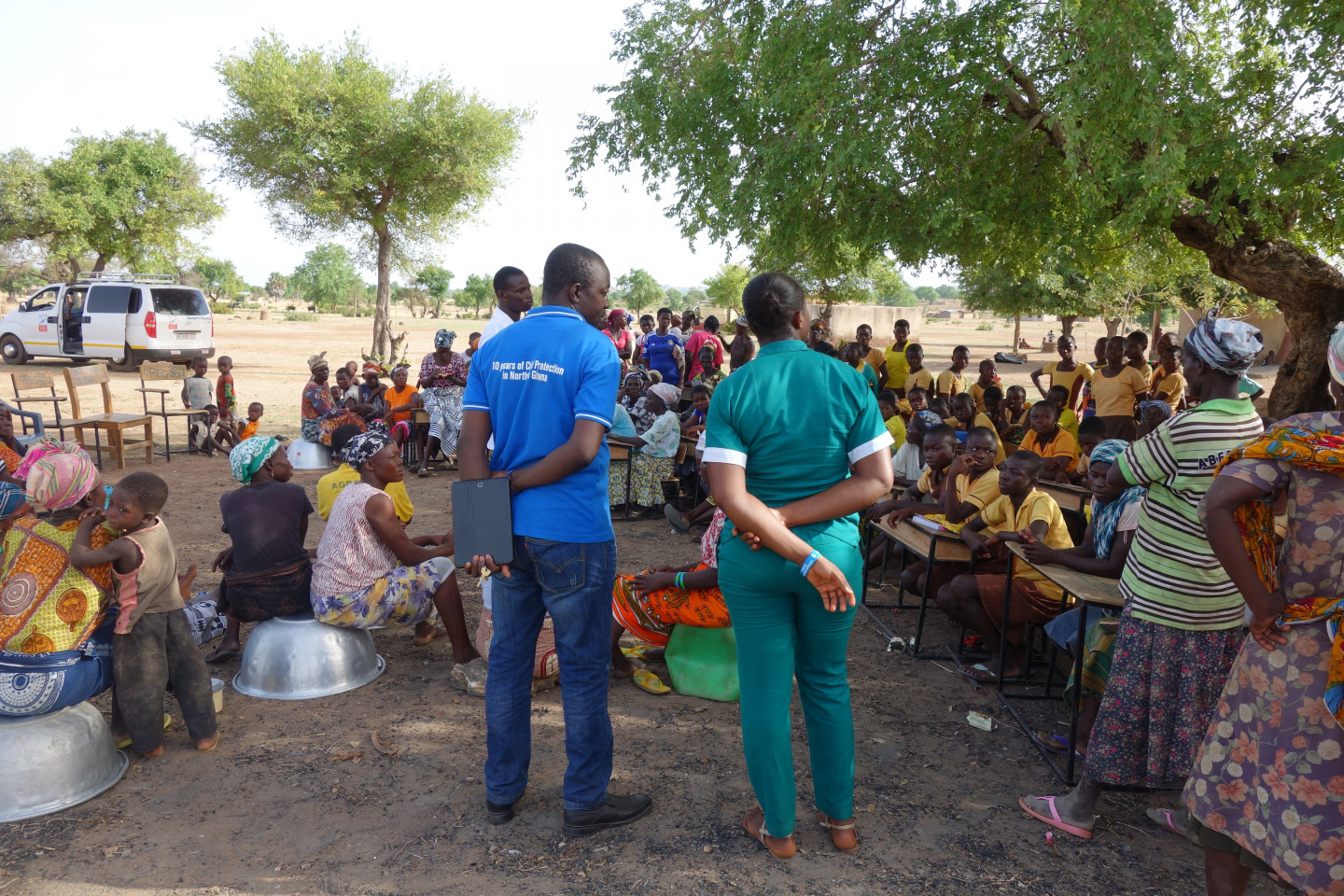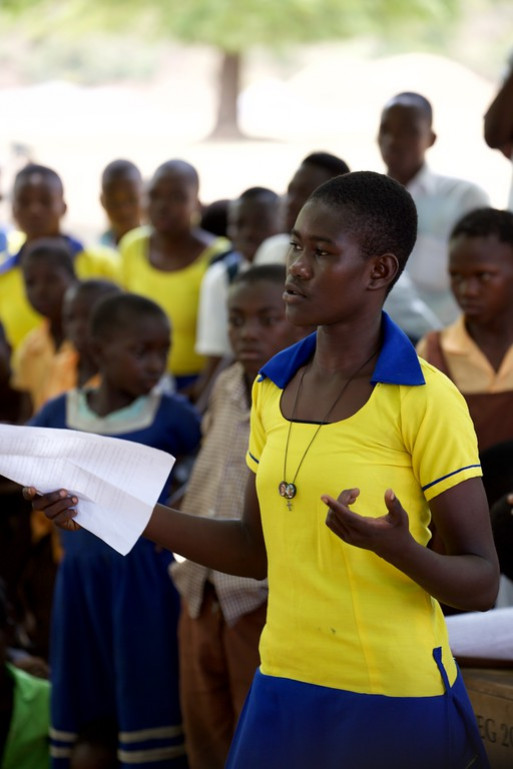Participatory Approaches and Locally Led Solutions Matter!
AfriKids vision is for our everyday approach to be participatory in the manner in which we engage with children and communities with whom we work with. Our headquarters are based in Bolgatanga in northern Ghana, whereby our award-winning team of local staff authentically listen to the children and communities with whom we work with and empower them to make changes themselves. Indeed, our team of local staff in Ghana have a deep personal commitment and experience in applying participatory approaches and locally led solutions, which ensure that people can make changes that can be sustained without our ongoing support.
AfriKids model of applying participatory approaches and locally led solutions initiates at the project design (conceptualisation) stages, and is also applied in implementation, monitoring and evaluation stages too. Throughout all of these stages, children and local communities are listened to and empowered to exercise their collective agency and they determine the direction for change, plan their priorities, and decide whether the intervention has made progress and delivered relevant change.
Everyone’s perspective within the community is listened to – from children, parents and community groups to the local government so that child protection, education and health systems work for all children. In this sense, participatory approaches and locally led solutions enable children and local community members to express their views, share decision making, contribute to the planning process and influence the delivery of the projects which is vital in terms of shifting traditional power dynamics to the children and local communities with whom we work with.
Participatory approaches used at the level of project design and conceptualisation stages:
Our programmes are developed by listening to what local people tell us they really need. Our exceptional stakeholder consultation gives every level of society a say on what we do and gives us a clear view on what the government and other actors are doing. This ensures our projects are always truly needed, wanted and bought into by everyone it takes to make them work. At design and conceptualisation stages community stakeholders including the children, families, and key socio-economic groups within communities, to local governments take part in PLA (participatory learning and action)/PRA (Participatory Rural Appraisal) exercises whereby PLA tools are used to combine the sharing of insights with analysis, and this provides a catalyst for the community themselves to act on what is uncovered. Throughout this process, we have seen that some of the findings and assumptions from preliminary research and secondary data is challenged. This is where the real “leave no one behind” gaps lie – and we fill them.

Participatory approaches used at the level of implementation of projects:
Participatory approaches are used in the implementation of our projects as a means to create an enabling environment whereby focus lies in listening and empowering children, their families and the communities in which they live. For example, children are listened to and empowered in Child Right Clubs, as they enable children to meet, establish friendships and also to actively participate and contribute to discussions that relate to decisions affecting them in health, education, protection and local and national governance. As a group they are also given the chance to perform various activities, such as for example taking part in radio talks, performing plays, poetry recitals, essay competitions, songs and routine marches to demand their rights and draw public attention to issues that affect them, such as, child marriage, child labour and the spirit child phenomenon, among other issues.
Indeed, Child Right Club workshops are designed with a particular focus on hearing and enhancing children’s voices so that they are listened to, and they elect their Child Right Club leaders within a democratic and participatory social mobilisation process. Coaching, mentoring and peer collaboration are also all fruits of the club’s participatory approaches. Implementing all of this, involves a profound change in the status of children in society and the nature of relationships between adults and children. For most children, being listened to and respected and having the opportunity to play a meaningful role in issues which affect them is not an option, which is why Child Right Clubs are essential in ensuring that children are able to realise their right to be heard. Indeed, Child Right Club members have expressed that they want more opportunities for participation at all levels in their community and have a great deal to offer in terms of transforming society now and in the future.
It is important to also highlight that Child Right Clubs are open to every child, no matter whether that child lives on the street and has no family or goes to school and has a family. Children with disabilities and from marginalised groups are also encouraged to join the clubs and children of different ages are also welcome in the Clubs although they are not suitable for very young children like those in Day Care.
On a broader community scale, community meetings and Durbars are also another mode in which participatory approaches can be applied as a means to ensure that community members contribute to locally led solutions and societal change. Local community meetings permit everyone’s perspectives and thoughts to be considered, which entails everyone putting forward their ideas and thoughts in a respectful manner. This doesn’t necessarily assume that the professionals or the well-educated automatically know what is best - everyone gets to participate in the planning process and has some role in decision making.
The Durbar, on the other hand, is a festival, which brings together a large number of people from the community and other locations. During the Durbars, for example, women compose and sing songs against the practice of child infanticide, child marriage, among other issues. Child Right Club members also perform poetry recitals, drama plays and sing songs against issues that affect children’s rights, and they also highlight the need for societal change in attitudes towards these issues.
In this sense, participatory approaches also lends itself to effective advocacy. Once the community takes part in identifying a problem and works towards a sustainable solution to address the problem, they then lead from the front. For example, former concoction men (traditional healers) who previously performed a traditional practice whereby children with disabilities were killed are now ‘Right to Life’ promoters advocating to ensure that the ‘spirit child phenomenon’ is eradicated. This kind of advocacy changes attitudes, norms and perceptions in favour of ensuring that children’s rights are protected.

Participatory approaches used at the level of monitoring and evaluation stage:
Participatory evaluation involves community stakeholders of a project during all stages of the evaluation process: design, data collection and analysis and reporting. The impact evaluation design includes both quantitative and qualitative data. However, it is ultimately the local community who decide whether the project has made progress and delivered relevant change and this feedback is provided via stakeholder evaluations, participatory social mapping, outcome mapping, causal linkage and trends, change diagramming, and brainstorming on programme strengthens and weaknesses. The projects team then incorporates these ideas and feedback into the review process to enhance the relevance and efficiency of interventions, for example, activities included in Child Right Clubs, radio discussions, forums, festivals, workshops, and meetings are implored to improve the participatory implementation and monitoring and evaluation process.
Participation delivers better outcomes
Participatory approaches promotes cooperation and enables community members to work in concert enabling stakeholders to leverage on their collective strengths and resources for a better child rights environment. For example, outcomes from government officials from the Department of Social Welfare, the Ghana Health Service and the Police Service among other key government stakeholders who attend, for example, Durbars and community meetings enforce greater sensitivity to and understanding of children’s rights and a more positive attitude to ensure that actions are taken to eliminate all forms of child rights abuses. Further outcomes have included municipal and political commitments to do more to protect children’s rights and engage and listen to children.
Indeed, when children are listened to, the services designed to meet their needs are more effective (and thus more efficient). Evidence about the beneficial outcomes and impact of children’s participation has been published in toolkits and frameworks for monitoring and evaluating children’s participation. The results demonstrated that children and young people consistently benefit personally from active participation, developing greater awareness of their rights; more self-confidence, heightened self-esteem; leadership skills; and improved confidence to negotiate with adults, which in turn contributes towards change in societal attitudes to ensure that child protection, education and health systems work for all children.
